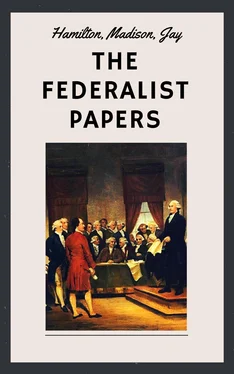We may indeed with propriety be said to have reached almost the last stage of national humiliation. There is scarcely anything that can wound the pride or degrade the character of an independent nation which we do not experience. Are there engagements to the performance of which we are held by every tie respectable among men? These are the subjects of constant and unblushing violation. Do we owe debts to foreigners and to our own citizens contracted in a time of imminent peril for the preservation of our political existence? These remain without any proper or satisfactory provision for their discharge. Have we valuable territories and important posts in the possession of a foreign power which, by express stipulations, ought long since to have been surrendered? These are still retained, to the prejudice of our interests, not less than of our rights. Are we in a condition to resent or to repel the aggression? We have neither troops, nor treasury, nor government.(1) Are we even in a condition to remonstrate with dignity? The just imputations on our own faith, in respect to the same treaty, ought first to be removed. Are we entitled by nature and compact to a free participation in the navigation of the Mississippi? Spain excludes us from it. Is public credit an indispensable resource in time of public danger? We seem to have abandoned its cause as desperate and irretrievable. Is commerce of importance to national wealth? Ours is at the lowest point of declension. Is respectability in the eyes of foreign powers a safeguard against foreign encroachments? The imbecility of our government even forbids them to treat with us. Our ambassadors abroad are the mere pageants of mimic sovereignty. Is a violent and unnatural decrease in the value of land a symptom of national distress? The price of improved land in most parts of the country is much lower than can be accounted for by the quantity of waste land at market, and can only be fully explained by that want of private and public confidence, which are so alarmingly prevalent among all ranks, and which have a direct tendency to depreciate property of every kind. Is private credit the friend and patron of industry? That most useful kind which relates to borrowing and lending is reduced within the narrowest limits, and this still more from an opinion of insecurity than from the scarcity of money. To shorten an enumeration of particulars which can afford neither pleasure nor instruction, it may in general be demanded, what indication is there of national disorder, poverty, and insignificance that could befall a community so peculiarly blessed with natural advantages as we are, which does not form a part of the dark catalogue of our public misfortunes?
This is the melancholy situation to which we have been brought by those very maxims and councils which would now deter us from adopting the proposed Constitution; and which, not content with having conducted us to the brink of a precipice, seem resolved to plunge us into the abyss that awaits us below. Here, my countrymen, impelled by every motive that ought to influence an enlightened people, let us make a firm stand for our safety, our tranquillity, our dignity, our reputation. Let us at last break the fatal charm which has too long seduced us from the paths of felicity and prosperity.
It is true, as has been before observed that facts, too stubborn to be resisted, have produced a species of general assent to the abstract proposition that there exist material defects in our national system; but the usefulness of the concession, on the part of the old adversaries of federal measures, is destroyed by a strenuous opposition to a remedy, upon the only principles that can give it a chance of success. While they admit that the government of the United States is destitute of energy, they contend against conferring upon it those powers which are requisite to supply that energy. They seem still to aim at things repugnant and irreconcilable; at an augmentation of federal authority, without a diminution of State authority; at sovereignty in the Union, and complete independence in the members. They still, in fine, seem to cherish with blind devotion the political monster of an imperium in imperio. This renders a full display of the principal defects of the Confederation necessary, in order to show that the evils we experience do not proceed from minute or partial imperfections, but from fundamental errors in the structure of the building, which cannot be amended otherwise than by an alteration in the first principles and main pillars of the fabric.
The great and radical vice in the construction of the existing Confederation is in the principle of LEGISLATION for STATES or GOVERNMENTS, in their CORPORATE or COLLECTIVE CAPACITIES, and as contradistinguished from the INDIVIDUALS of which they consist. Though this principle does not run through all the powers delegated to the Union, yet it pervades and governs those on which the efficacy of the rest depends. Except as to the rule of appointment, the United States has an indefinite discretion to make requisitions for men and money; but they have no authority to raise either, by regulations extending to the individual citizens of America. The consequence of this is, that though in theory their resolutions concerning those objects are laws, constitutionally binding on the members of the Union, yet in practice they are mere recommendations which the States observe or disregard at their option.
It is a singular instance of the capriciousness of the human mind, that after all the admonitions we have had from experience on this head, there should still be found men who object to the new Constitution, for deviating from a principle which has been found the bane of the old, and which is in itself evidently incompatible with the idea of GOVERNMENT; a principle, in short, which, if it is to be executed at all, must substitute the violent and sanguinary agency of the sword to the mild influence of the magistracy.
There is nothing absurd or impracticable in the idea of a league or alliance between independent nations for certain defined purposes precisely stated in a treaty regulating all the details of time, place, circumstance, and quantity; leaving nothing to future discretion; and depending for its execution on the good faith of the parties. Compacts of this kind exist among all civilized nations, subject to the usual vicissitudes of peace and war, of observance and non-observance, as the interests or passions of the contracting powers dictate. In the early part of the present century there was an epidemical rage in Europe for this species of compacts, from which the politicians of the times fondly hoped for benefits which were never realized. With a view to establishing the equilibrium of power and the peace of that part of the world, all the resources of negotiation were exhausted, and triple and quadruple alliances were formed; but they were scarcely formed before they were broken, giving an instructive but afflicting lesson to mankind, how little dependence is to be placed on treaties which have no other sanction than the obligations of good faith, and which oppose general considerations of peace and justice to the impulse of any immediate interest or passion.
If the particular States in this country are disposed to stand in a similar relation to each other, and to drop the project of a general DISCRETIONARY SUPERINTENDENCE, the scheme would indeed be pernicious, and would entail upon us all the mischiefs which have been enumerated under the first head; but it would have the merit of being, at least, consistent and practicable Abandoning all views towards a confederate government, this would bring us to a simple alliance offensive and defensive; and would place us in a situation to be alternate friends and enemies of each other, as our mutual jealousies and rivalships, nourished by the intrigues of foreign nations, should prescribe to us.
Читать дальше












